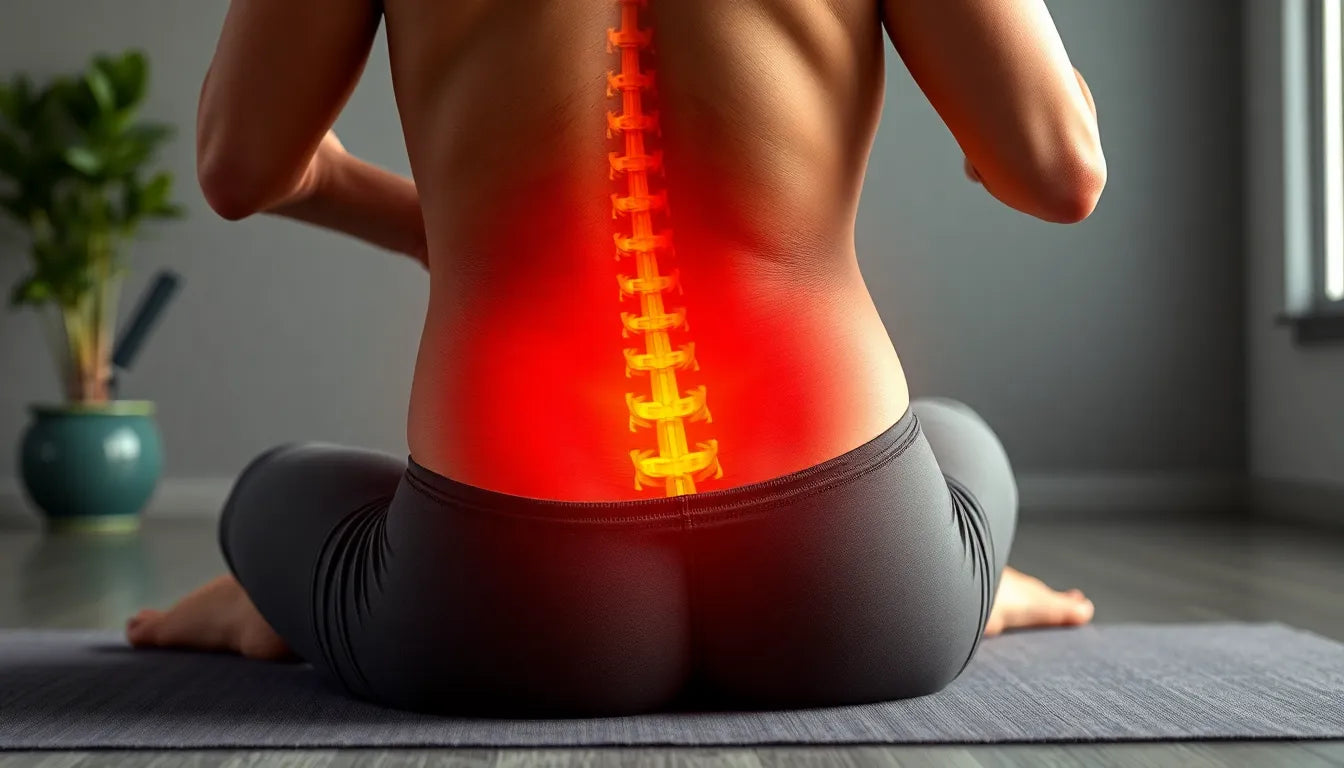Back pain is a common ailment that affects millions of people worldwide, often disrupting daily life and limiting mobility. Among the various causes of back pain, the terms "herniated disc" and "sciatica" frequently come up in conversations, but they are not the same thing. Understanding the difference between these two can be crucial for effective treatment and management.
Defining herniated disc and sciatica
A herniated disc occurs when the soft, jelly-like center of a spinal disc pushes through a crack in the tougher exterior casing. This condition can press on nearby nerves, leading to pain and discomfort. The spinal discs act as cushions between the vertebrae, and when one becomes herniated, it can cause significant back pain and other symptoms depending on its location and severity.
On the other hand, sciatica is not a condition itself but rather a symptom. It is characterized by pain that travels along the sciatic nerve, which extends from the lower back through the hips and down each leg. Sciatica occurs when this nerve is compressed or irritated, often due to a herniated disc, but other conditions such as spinal stenosis or injuries can also lead to sciatica.
The relationship between the two
While a herniated disc can cause sciatica, not all herniated discs result in this symptom. Similarly, not all cases of sciatica are due to a herniated disc. Understanding this relationship is essential for diagnosing and treating back pain effectively. It is crucial to identify whether the root cause of sciatica is a herniated disc or another condition to ensure the appropriate treatment path is followed.
Why understanding the difference matters
Distinguishing between a herniated disc and sciatica is vital for several reasons. Firstly, it helps in determining the most effective treatment strategy. A herniated disc may require different interventions compared to treating sciatica, especially if the latter is caused by another underlying issue. Secondly, understanding the difference can help manage expectations regarding recovery time and the severity of symptoms.
The goal of this blog is to unravel the pain puzzle associated with these conditions and provide clarity on which might be perceived as "worse." By delving deeper into the severity, prognosis, and treatment options in the following sections, we aim to equip you with the knowledge needed to navigate these common yet often misunderstood sources of back pain.
Severity and prognosis of herniated disc vs. sciatica
When it comes to determining which condition is worse, herniated disc or sciatica, it largely depends on the severity and prognosis of each. Sciatica is often described as extremely painful, with many patients comparing it to the intensity of childbirth or kidney stones. This symptom typically manifests as a shooting pain down the leg, accompanied by tingling, weakness, and burning sensations that can extend to the foot. The severity of sciatica can vary, but it is generally considered a severe form of nerve pain.
In contrast, the symptoms of a herniated disc can range significantly. Some individuals may experience no symptoms at all, while others may suffer from severe radicular pain if the herniated disc presses on a nerve. The variability in symptoms is due to the location and extent of the disc herniation. While sciatica often resolves more quickly with conservative treatment, a herniated disc may require more prolonged care, and in some cases, surgical intervention might be necessary, especially if conservative measures fail to alleviate symptoms.
Factors influencing which is worse
Most sources avoid providing a definitive answer to the question of which is worse, herniated disc or sciatica, because they are different conditions with distinct implications. Several factors influence the severity of each condition. The underlying cause plays a significant role; for instance, a mild herniated disc might not cause any symptoms, whereas a severe one could lead to intense pain. Additionally, the intensity and duration of nerve compression, individual symptoms, and response to treatment also play critical roles in determining the severity.
Treatment and management approaches
Both herniated disc and sciatica are typically managed initially with conservative treatment options. Physical therapy, pain management, and chiropractic care are common approaches to alleviate symptoms and improve mobility. These treatments aim to reduce inflammation, strengthen muscles, and enhance flexibility, ultimately leading to pain relief and improved function.
In cases where symptoms persist or are severe, more advanced interventions may be necessary. For herniated discs that do not respond to conservative treatment, options such as injections or surgery might be considered. Surgery is usually reserved for cases where symptoms are severe or functionally disabling, and conservative measures have failed to provide relief.
Comparison table: herniated disc vs. sciatica
| Feature | Herniated Disc | Sciatica |
|---|---|---|
| What it is | Spinal disc displacement/tear | Symptom (nerve pain) |
| Common symptoms | Back/neck pain, may cause sciatica | Shooting leg pain, tingling, numbness |
| Severity | Ranges from no symptoms to severe | Often severe pain, degree varies |
| Treatment | PT, meds, surgery if severe | PT, meds, resolves faster in many cases |
| Which is worse? | Depends on symptoms and complications | Depends on cause; pain often severe |
In conclusion, the question of which is worse, herniated disc or sciatica, is nuanced. Sciatica pain is often more acutely severe, but a herniated disc can be a more complex underlying condition requiring prolonged care. The answer depends on the individual case, underlying cause, and response to treatment. Understanding the differences and seeking appropriate medical advice is crucial for effective management and relief.
Nuances in severity and management
Determining which condition is worse, a herniated disc or sciatica, often depends on individual circumstances. While sciatica is known for its intense, often debilitating pain, it is important to remember that it is a symptom, not a condition. The complexity of a herniated disc, as an underlying cause, can require more extensive care, especially if it leads to nerve compression. Each person's experience can vary significantly based on the root cause and the body's response to treatment.
Actionable advice for managing symptoms
For those experiencing persistent back pain, consulting a healthcare provider is crucial for accurate diagnosis and treatment. Early intervention can prevent the progression of symptoms and improve outcomes. In addition to professional medical advice, there are several home management strategies that can help alleviate discomfort:
- Gentle stretching: Incorporating regular stretching exercises can help maintain flexibility and reduce muscle tension.
- Posture correction: Maintaining proper posture, especially during prolonged sitting or standing, can alleviate pressure on the spine.
- Physical therapy: Engaging in physical therapy can strengthen supporting muscles, improve mobility, and provide tailored exercises to address specific issues.
These steps, combined with professional guidance, can aid in managing symptoms effectively and enhancing quality of life.
Conclusion
In summary, understanding the distinction between a herniated disc and sciatica is essential for effective management. Sciatica, as a symptom, often presents with severe nerve pain, while a herniated disc is a condition that may or may not cause sciatica. Both require proper diagnosis and tailored treatment strategies. By recognizing these differences, individuals can make informed decisions about their care and seek the most appropriate interventions for relief.
Frequently asked questions
What are the main causes of sciatica besides a herniated disc?
Besides a herniated disc, sciatica can be caused by spinal stenosis, injuries, and piriformis syndrome. These conditions can lead to compression or irritation of the sciatic nerve, resulting in pain.
Can a herniated disc heal on its own?
In many cases, the symptoms of a herniated disc improve with conservative treatment, such as physical therapy and pain management. However, some cases may require surgical intervention if symptoms persist or are severe.
How long does it typically take for sciatica to resolve?
Sciatica often improves within a few weeks with appropriate care, but the timeline can vary based on the underlying cause and individual response to treatment.
When should I consider surgery for a herniated disc?
Surgery is usually considered if conservative treatments fail and symptoms are severe or disabling. A healthcare provider can help determine the best course of action based on individual circumstances.
Are there any lifestyle changes that can help prevent these conditions?
Maintaining a healthy weight, engaging in regular exercise, practicing proper posture, and making ergonomic adjustments can help reduce the risk of developing these conditions. These lifestyle changes contribute to overall spinal health and can prevent future issues.
By offering clear explanations and guidance, this blog post aims to empower readers with the knowledge needed to navigate their symptoms and seek appropriate care.
Sources
- Performance Ortho. "Herniated Disc vs. Sciatica: Understanding the Differences."
- Pauza, K. "Sciatica vs. Herniated Disc: A Patient's Guide."
- Village Chiros. "Understanding Herniated Discs and Sciatica."
- PostureWorks. "Comparing Herniated Disc and Sciatica: Treatment Options."
- Prestige Health. "Diagnosing Sciatica and Herniated Discs: What You Need to Know."
- SC Osteo. "Symptoms of Sciatica vs. Herniated Disc: A Diagnostic Perspective."


















